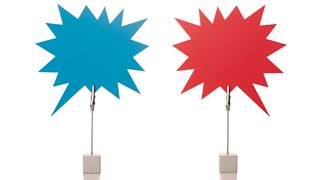How to learn a language: tips from a polyglot
For many, periods of lockdown have proved the perfect opportunity to learn a new skill. According to a survey by the British Council, 10% of respondents used the first lockdown to learn a new language or brush up on their linguistic skills after a break.
In Word of Mouth, Michael Rosen discusses life as a polyglot (someone who speaks many languages) with Alex Rawlings, who grew up in London, is a quarter Greek, lives in Barcelona and has a degree in German and Russian. He speaks an impressive 15 different languages! If you’re thinking of stretching your linguistic muscles and mastering Mandarin, dabbling in Italian, or revisiting French, here are six things you should know.

1. You’re never too old
You may not be able to teach an old dog new tricks, but you certainly can teach an adult a new language. Many people are put off by research which says we lose our ability to develop fluency in a language after a certain age. Some linguists support the idea of a ‘critical window’, which is where our ability to learn new languages fluently switches off after a certain age.
suggests this happens when we are around 17-years-old. This study, however, only looked at participant’s ability to grasp the grammar of another language proficiently. But how many of us can say we have a perfect grasp of the grammar of our first language? Your age isn’t a barrier to learning a foreign vocabulary to a really high standard, even if you make some grammatical errors. Native speakers of the language you learn will be far more appreciative if you speak it imperfectly than if you talk LOUDLY and s-l-o-w-l-y to them in English.
-
![]()
Word of Mouth: Being a Polyglot
Alex speaks 15 languages fluently. Does he have a special gift or could we all do this?
-
![]()
Do we think differently in different languages?
How much of an impact does the language you speak have on how you actually think?
2. Learning a language is a skill that you can learn
Alex Rawlings may speak 15 languages, but he tells Michael Rosen that this isn’t because he’s inherently different from anyone else.
Learning a language is a great undertaking, and some may indeed find it easier than others, but it’s not an ability that only certain people have, it’s the product of inquisitiveness and effort.
“It’s a little bit uncomfortable when people talk about you as having some kind of language ‘gift’ or being some kind of language genius,” he says. “It’s not how I see myself. For years I didn’t speak those languages, and for years I had to learn them and had to really struggle with that.”
So even accomplished linguists see themselves as a work-in-progress. Alex says that he sees language as one of the most “humbling” things you can do because you are always “painfully aware of how much you don’t know.” Learning a language is a great undertaking, and some may indeed find it easier than others, but it’s not an ability that only certain people have, it’s the product of inquisitiveness and effort. Not only this, but for millions of people around the world it is a necessity, explains Alex.
“Look at Africa, South America. It’s not just that you have to have a ‘language gift’ to be multi-lingual. If you live in Johannesburg, you basically need five languages just to survive, and everybody speaks them.”

3. How to start learning a language
Alex loves the process of learning new words, and finds it “exhilarating” to go from seeing a foreign word on a page to adding it to his vocabulary. He says: “The very first thing I do is to try and learn some basic words and greetings to get my tongue around them, to get used to hearing them and to get used to the sound and the rhythm of the language.” He then follows a book or course designed for solo learners. Alex’s tip is to make a vocabulary mind-map. “I take a topic like going to the shop, and on a piece of paper I write out every single phrase I could ever imagine needing at the shop, then try to find those phrases on the Internet, or translate them, and memorise them. Then, whenever I’m in that situation, I have all of the vocabulary I need at hand. You can repeat that for as many situations as you want.”
I take a topic like going to the shop, and on a piece of paper I write out every single phrase I could ever imagine needing at the shop, then try to find those phrases on the Internet, or translate them, and memorise them.Alex’s tip on making a vocabulary mind-map
Lots of people also find language-learning apps helpful for picking up vocabulary. These have been especially popular during periods of lockdown, with the number of new users of the app Duolingo soaring 132% in the UK in 2020. One of the benefits of an app is that your successes and failures are more discreet, so there’s no fear of getting something wrong in front of a class.

How many words does it take to learn a language?
The importance of frequently used words when learning an additional language.
4. Watch foreign films and read foreign books, surround yourself with the language
You don’t need to return to the classroom if you want to take your language learning beyond mind-maps and apps. There are all sorts of options available to us that may be better suited to our learning style than a school-like setting. Alex says: “For me, the most successful way of learning a language is when you don’t feel like you’re learning at all.” One way of doing this is to watch foreign films or read foreign books.
The most successful way of learning a language is when you don’t feel like you’re learning at all. One way of doing this is to watch foreign films or read foreign books.
suggest that the visual clues from watching films and television series in different languages can be really helpful for picking up the language. The tone of voice, facial expressions and body language that accompany certain phrases can help to convey their meaning, for instance. Not only this, but they can expose you to accurate pronunciation, different accents and dialects, and the nuanced ways in which native speakers use language in conversation, rather than textbook-perfect examples.
Alex thinks that learning for the sake of passing an exam, as we tend to at school, is not a great incentive, whereas doing so to open up the culture of another country can be truly motivating. “I’d really like language lessons to be less about learning the language and more about exploring the world.”
5. Practise little and often, perhaps an hour a day
For native English speakers, some languages are easier to learn than others. The Foreign Service Institute created a five-tier rank to determine how easy languages are for English speakers to pick up, and how long they would take to learn, based on their similarities to English.
Languages such as French, Spanish, Norwegian and Afrikaans were deemed to be the easiest, taking between 575-600 hours to acquire a basic fluency. Japanese, Korean and Arabic are some of the trickiest for native English speakers, and could take up to 88 weeks, or 2200 hours, to get to grips with. , is thought to be a more productive way of learning than in longer, but more sporadic chunks.

6. The more languages or even regional dialects you know, the better…
There are benefits to speaking more than one language that go beyond the joy of being able to communicate more broadly. Research has shown that . Not only this, but stroke patients who speak more than one language are more likely to regain their cognitive functions than those who speak just one.
Being bilingual, or even speaking another regional dialect such as Geordie or Scouse, has been shown to help your brain in many ways.
The study of 600 patients found that 40.5% of multilingual patients had normal mental functions afterwards, compared to just 19.6% of monolingual patients. Being bilingual has even been shown to .
While speaking multiple languages gives people a diverse range of advantages, being Geordie, Scouse or Bristolian might help too. has shown that those who speak two dialects of the same language could share a cognitive profile with bilinguals. In one study, children were scored after being tested on memory, attention, and cognitive flexibility, and it was found that multilingual and bi-dialectal children both had an advantage over their peers who spoke one language. And in Norway, children who had been taught to write in two Norwegian dialects scored more highly in standardised tests than the national average.
Whether you want to brush up your language skills for future holidays, to be able to watch foreign films without the subtitles, discover literature from around the world, chat with new people or colleagues, or simply give your brain a boost, there’s no reason not to give language learning a try.
From Βι¶ΉΤΌΕΔ Ideas

The perks of being able to speak 25 languages
Richard Simcott is a hyperpolyglot, meaning he has a gift for learning new languages.
-
![]()
Word of Mouth: Being a Polyglot
Alex speaks 15 languages fluently. Does he have a special gift or could we all do this?
-
![]()
How sign language is constructed
Stephen Fry finds out what British Sign Language can tell us about language in general.
-
![]()
What was the first language?
Is it possible to trace thousands of languages that exist today back to a single ancestor?
-
![]()
Game on! The language of video games explained
How gaming is influencing our language. It's time for you to level up!





